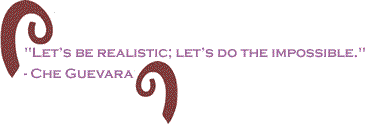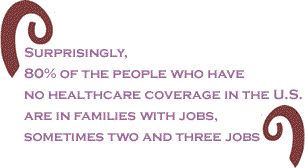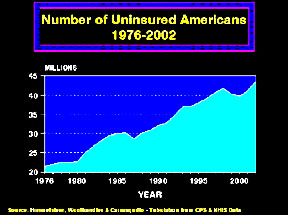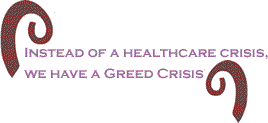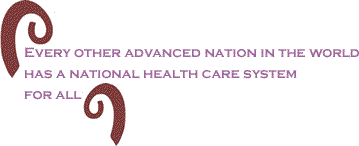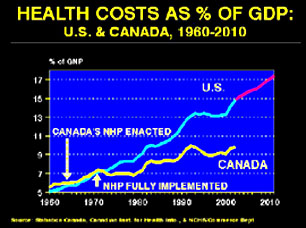
|
|||||||||||||||||||||
 |
|||||||||||||||||||||
 |
|||||||||||||||||||||
 |
|||||||||||||||||||||
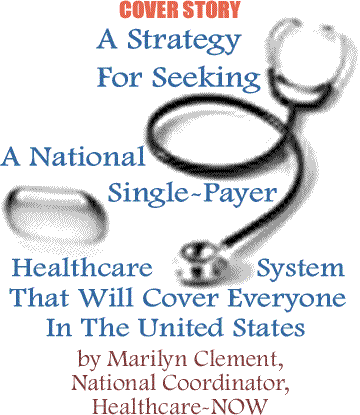 |
|
|
“The Time is Now.” said Congressman John Conyers to the Healthcare-NOW national strategy meeting, November 12, 2006, in Chicago. Conyers and 60 Healthcare-NOW organizers from 16 states joined in thinking about how to push forward for a single-payer national healthcare system in the United States in a marathon 10-hour strategy session. Healthcare-NOW is a bottom up movement organization, so the strategies evolved throughout the day came from very few speeches and a lot of discussion. Conyers's bill H.R. 676 will provide healthcare for everyone in the United States by eliminating the profits of the insurance companies and negotiating drug and other treatment costs. It will be paid for on a sliding scale by all of us together. We will have no bills, co-payments, deductibles, denials, or bankruptcies. And we will be paying less than we are now. Conyers told the organizers, “It is a great thing to look back on your life and see the opportunities to make history. It is a wonderful way to live.” He spoke of his first decision to run for Congress as a young lawyer. He won by 128 votes! He has been key to many investigations, impeachments, forward-looking and controversial legislation including the Martin Luther King Holiday, and visionary leadership. Now, as he becomes the leader of the House Judiciary Committee, he will have jurisdiction over many areas, including “bankruptcy.” As we look into the future, bankruptcy hearings will be able to uncover the reasons why 50% of the personal bankruptcies in the United States are caused by healthcare crises. Healthcare-NOW can help provide the testimony. That is just one example of why we feel hopeful for this coming period. The Current System Some people say, "Why don't they just get a job?" Surprisingly,80% of the people who have no healthcare coverage in the U.S. are in families with jobs, sometimes two and three jobs. The healthcare system is probably the most devastating factor in the failure of our economic system, particularly for families. Almost 50 million with no coverage; another 50 million with inadequate coverage; and another 50 million in fear of losing their jobs or their coverage.
But, family budgets are not the only budgets affected:
A New Organizing Strategy Healthcare-Now believes that we have come to a crossroads, as a nation, on this issue. Our national effort to get universal health care was lost fourteen years ago for many reasons, not the least of which was the stranglehold of the insurance industry in control of the media and the U.S. Congress.
Instead of a healthcare crisis, we have a Greed Crisis. The profits of insurance and pharmaceutical drug companies have multiplied during the same period that people’s healthcare has become less comprehensive and less affordable. Special Interest money has turned health care into an incredibly profitable business, ranking second only to the military-industrial-congressional complex. Another word for our healthcare crisis might be a "Profiteer Crisis." Over $2 trillion each year is at stake in the healthcare industry. But all of that could be changed fairly quickly if we cut the profits of the profiteers and put that money into real healthcare. What Is the Difference This Time? There is a movement building to change the system. Many more people are beginning to realize that our country is at an economic disadvantage under this economic drain. Every other advanced nation in the world has a national health care system for all. Try asking a crowd of people if they know anyone in Europe who doesn’t have health care coverage. Or in Taiwan, Singapore, Japan, South Korea, Malta, Costa Rica, Cuba or dozens of other countries in the world. Healthcare-NOW has a new set of strategies that can help build on the overwhelming sentiment for universal healthcare nationwide. (65% of the people). We have begun by building a new partnership between:
Healthcare-NOW is building a foundation that will lead this effort to build a huge movement, and to secure a healthier and more responsive Congress that will hear our demands in 2007 and 08 and 09 for a single payer national healthcare system. What we want is a privately administered, publicly funded system, an American-style system that provides for people to choose their own private doctors to administer the health care that is needed, without having to seek permission from insurance company clerks whose main interest is profits. Our system would be publicly funded using the same money we are now spending. Everyone would pay less money than we are now paying. (See HR 676 as a basic model for this effort, or our website for a summary). How Can We Do This? - A Publicly Funded/ Privately Administered System with Freedom of Choice Healthcare-NOW is building a movement similar to the movement for voting rights in this country in the 1960's. At the time, we were told that we were moving too fast and demanding too much, that the times were changing and that civil rights would come in due time if we just kept waiting patiently. We refused to wait then and we must refuse to wait NOW. The Economic Case The U.S. economy is in its worst shape in many years. Oil prices are at the highest level ever. Many people need not apply for healthcare insurance because they are banned – pre-existing conditions and low income level make it impossible.
We are convinced that the success of this campaign could change the economics in this country, that working to cure the healthcare crisis has the possibility of opening up a new deal for our citizens in the health care sector and other sectors if we win this one.
Families would have more money in their pockets to spend on their other needs if we passed a single payer healthcare plan. People would have more choices and the economy would flourish with a new infusion of consumer capital and consumer confidence. Our people would be healthier in body and in spirit.
Jobs would be created in the health care industry because there will be almost 100 million more people eligible to receive the health care they need. People who need dental and optical care, mental health care, drug treatment, physical therapy, prescription drugs, and long term care, all of these and more would be covered and we will need healthcare professionals to respond. How the goal can be reached The 30,000 people on the Healthcare-NOW email list probably played a role in electing a “healthier Congress” November 7, 2006. Those who voted for the Healthcare Congress deserve to have a heads-up on what is coming next. We may never have a better possibility of pushing forward for a national healthcare system than right now, during the next few months. If not now, when?
Virtually every candidate who was elected had something to say about healthcare. They know that the voters want them to take a stand for healthcare. Here’s an excerpt from the New York Times, “Now, they say, they have to produce – to deal with long-festering problems like access to affordable healthcare, loss of manufacturing jobs, and an exit strategy from Iraq. There is a strong populist tinge to this class.” Be in touch with Healthcare-NOW for materials, for contacts in your area, to let us know what you are doing, and to participate on the conference calls with the organizers if you are planning to organize a Community Congressional Hearing on Healthcare. Now is the Time. This is the introduction to a series of articles on a A National Single-Payer Healthcare System That Will Cover Everyone In The United States. The preceding was compiled from information written by Marilyn Clement, National Coordinator, Healthcare-NOW. Click here to contact Ms. Clement and Healthcarde-NOW or telephone: 800 453-1305. Click here to read any of the articles in this special BC series on Single-Payer Healthcare. |
|
| Home | |
Your comments are always welcome. Visit the Contact Us page to send e-Mail or Feedback or Click here to send e-Mail to [email protected] e-Mail re-print notice
If you send us an e-Mail message we may publish all or part of it, unless you tell us it is not for publication. You may also request that we withhold your name. Thank you very much for your readership. |
|
| November 16, 2006 Issue 206 |
||||||||||||||
|
||||||||||||||
 |
||||||||||||||
|
||||||||||||||
| Printer Friendly Version in resizeable plain text format | ||||||||||||||
 |
||||||||||||||
 |
||||||||||||||
 |
||||||||||||||
 |
||||||||||||||
| |
||||||||||||||
| |
||||||||||||||





















